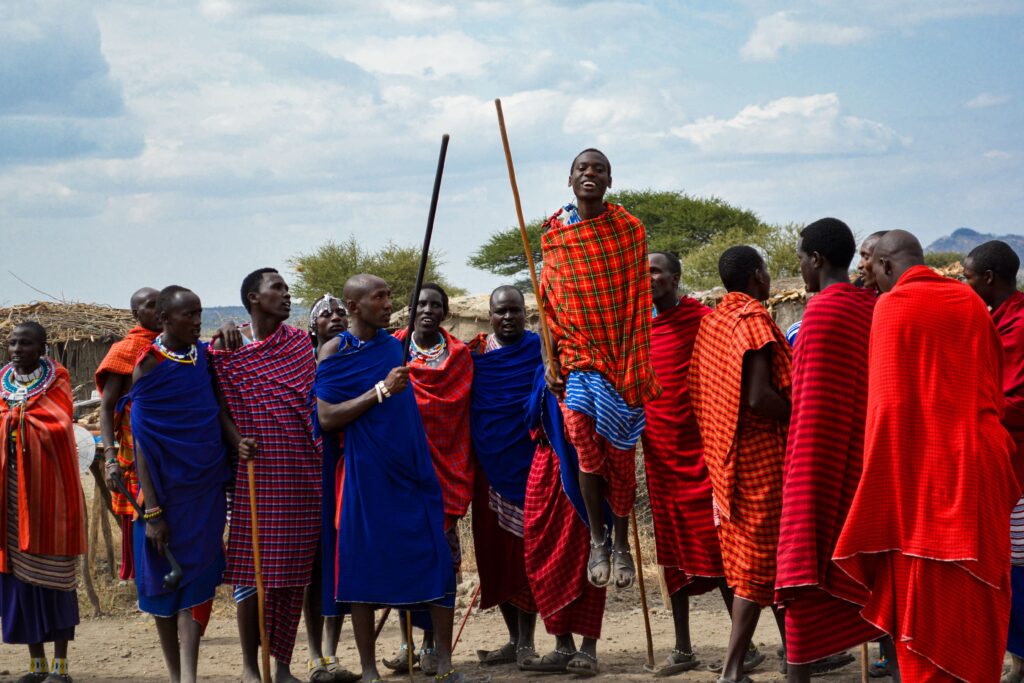Tanzania
Study Abroad in Tanzania
Have you ever wanted to go on safari and observe African wildlife in their natural habitat, explore some of Africa’s most famous national parks, or learn about the centuries-old traditions of the Iraqw, Hadzabe, and Maasai peoples?
Whether you’re an experienced traveler or looking for your first trip to another country, studying abroad is an important component of your college career. Living abroad gives you the opportunity to explore new places and learn about different cultures, gaining important global perspectives, discovering new things about yourself, and building lifelong friendships.
Our programs in Tanzania take place in world-famous national parks, wildlife sanctuaries and protected areas, and Indigenous communities and small villages. Courses and fieldwork focus on key environmental issues faced here such as biodiversity conservation, wildlife management, human-wildlife conflict, tourism impacts, and climate change. Tanzania has made progress in protecting its large populations of charismatic wildlife, but this rich landscape faces many challenges. Our research concentrates on understanding the impacts of climate change, habitat fragmentation, and competition for resources and promotes successful coexistence between humans and the country’s incredible wildlife.
Programs
Wildlife Management Studies
See Program Costs
Program Costs
- Tuition
- Room & Board
- Total
Fundamentals of Wildlife Management
See Program Costs
Program Costs
- Tuition
- Room & Board
- Total
Carnivores of the African Plains
See Program Costs
Program Costs
- Tuition
- Room & Board
- Total
Where You'll be Living
Learn to live the pole pole lifestyle at the SFS Center in Tanzania. Surrounded by world-famous national parks and wildlife, it’s the perfect home base for expeditions into the field. Campus is reminiscent of summer camp, with plenty of outdoor and communal spaces, while the small, friendly community of Rhotia is just a short walk away.
- Dorm living in four-person cabins
- Classroom, library, and computer lab
- Kitchen and dining hall, and on-site cooking staff
- Volleyball, gazebo, fire pit, and lounge areas
- Community soccer games and local running routes
- Markets in nearby towns of Rhotia, Karatu, and Mto Wa Mbu
Know before you go
Click on each dropdown to explore details about life at this Center, and determine if it’s the right fit for you.
Program experience
Living Conditions & Daily Life
Students participate in a structured schedule of classes and field activities from approximately 7 AM to 7 PM, including some weekends. A daily curfew is enforced at 7:00 PM.
Students live in shared dormitory-style housing (2–3 per room) and share communal meals with fellow students and staff. Evenings and most weekends offer personal time or optional SFS-organized activities.
During the semester, students may have the opportunity for brief independent travel (3–4 days), though free time is otherwise limited. The program includes 1–3 multi-day camping excursions, with students away from the center for extended periods.
Physical Readiness
Fieldwork includes data collection, game drives, wildlife tracking, and hiking up to 3 hours on uneven terrain under hot, dry, and dusty conditions. Students should prepare for extended sun exposure, bumpy safari vehicle rides, and long days outdoors.
Those with respiratory issues (e.g., asthma), dust allergies, or conditions affecting the neck, spine, or lower limbs may find aspects of the program particularly challenging.
A baseline level of physical fitness is essential, and accessibility is very limited for individuals with mobility impairments or special health conditions.
Travel & Transitions
Students are based at a rural field station near Rhotia village, about 3 hours from Arusha, and frequently travel to national parks and conservation areas such as the Serengeti, Ngorongoro, and Lake Natron.
Travel often includes long drives on rugged roads and multi-day camping trips without access to Wi-Fi, internet, or phone service. Semester students may also participate in brief local homestays, which can present austere and unfamiliar living conditions.
Field logistics are complex, and schedule changes due to weather, vehicle issues, or field conditions are common.
Location & Culture
Program Location & Natural Environment
Set in the agricultural village of Rhotia, the SFS Center is surrounded by diverse wildlife and expansive natural landscapes. The area offers high sensory immersion—from monkey calls and vivid landscapes to insects, reptiles, and birds.
Nearby sites include the Ngorongoro Conservation Area and Lake Natron, where students conduct immersive fieldwork.
Cultural & Linguistic Differences
Tanzania is home to multiple ethnic groups and languages, with traditions that influence social norms and expectations. Students engage directly with local communities, gaining insight into traditional gender roles, customs, and expectations. During community interactions, conservative dress is required (e.g., covered shoulders, long pants or shorts and skirts past the knee is required) and students are expected to follow local gender norms. Public displays of affection or expressions of sexual orientation or gender identity are discouraged and may not be culturally accepted.
Swahili and English are official languages. All SFS coursework is in English, and students receive basic Swahili language and cultural instruction during the semester.
health
Allergies & Dietary Preferences
Tanzanian cuisine commonly includes maize, starches, chicken, eggs, peanuts, and spices. In the field, meals are simple (e.g., sandwiches and a protein).
Gluten-free products and vegan alternatives are scarce, especially in remote locations.
While traveling or dining outside the Center, substitution options are limited, and cross-contamination cannot be guaranteed, especially on overnight camping expeditions. Gluten-free products and vegan protein sources are difficult to find, especially in rural areas.
Cross-contamination accommodations for advanced allergies abroad may not be feasible. Students with severe or life-threatening allergies and/or strict dietary requirements must consult with medical professionals and studentlife@fieldstudies.org before applying.
Required Vaccinations & Health Care
SFS requires students to obtain the Yellow Fever vaccine and take malaria prophylaxis for the program duration. For additional recommendations, consultation with a travel medicine professional is strongly advised before departure.
Basic care is approximately 30 minutes from the SFS Center; advanced medical care is about 3 hours away in Arusha. At times, students may be 6+ hours from medical support.
Routine in-person medical and counseling services are not feasible during the program. Students must bring a full supply of any prescription medications, including psychotropic medications, for the entire duration of the program, as local refills may not be available without prior arrangements.
PRogram Costs
Study abroad is an investment in yourself – you’ll return home with new experiences, skills, knowledge, and friendships that will stay with you for the rest of your life. SFS program costs cover a variety of expenses, including:
- Pre-program advising and on-site orientation
- Tuition and research fees
- Housing at the field station and on excursions
- Daily meals and snacks
- Airport transfers (for arrival/departure)
- Field excursions and cultural activities
- Student success and wellness team on site
- 24/7 mental health and well-being support
- Emergency evacuation and repatriation insurance
- Official transcript processing
Financial Aid
We know cost can be one of the biggest barriers to studying abroad. At SFS, we’re committed to making our programs accessible to students which is why we award a generous amount in need-based financial aid each year. Our Admissions Team has worked with thousands of students and are here to answer your questions about the SFS aid process, aid available through your home school, and funding from external sources.
SFS Financial Aid: Need-based aid packages typically consist of a combination of scholarships, grants, and zero- and low-interest loans. SFS matches Federal Pell Grant funding for students applying to an SFS semester program.
Home School Aid: Be sure to ask your home school study abroad office or financial aid office what financial aid resources might be available to support your study abroad experience.
External Funding Opportunities: Organizations such as the Fund for Education Abroad or the Gilman International Scholarship Program award scholarships to students going abroad. These can be a great opportunity to reduce the cost of your program even more.
Research
Research at the SFS Center for Wildlife Management Studies focuses on wildlife management, natural resource conservation, community socioeconomics and development, and human-wildlife conflict and conflict mitigation. Students use national parks, community conservation areas, and critical migratory corridors as field laboratories to study the behavioral ecology of Tanzania’s wildlife populations firsthand. We also work with local communities including Maasai, Iraqw, and Hadzabe tribal communities to examine current socioeconomic issues and environmental conservation challenges.
Our research focuses primarily on the following themes:
- Wildlife management & conservation
- Climate change impacts and adaptations
- African large mammal ecology and behavior
- Behavioral ecology of carnivores
- Reptile ecology and conservation
- Human-wildlife conflict
- Community-based conservation approaches
- Natural resource management
- Rural livelihoods and land use
Community
SFS is an active part of the Rhotia community, where we have been based for over a decade.
We have built long-term, collaborative relationships in the communities around the Center, and developed our research plans based on the environmental issues they and the surrounding ecosystems face. Throughout the program, students spend the day with a local family, attend cultural festivals and other community events, visit village markets, and enjoy soccer and volleyball games with community members.
At the end of each semester program, we host a Community Research Night where select students will present their research findings to the community. SFS research data is shared with the community, national parks and conservation areas, local NGOs, and the Tanzanian government.
Meet the Tanzania Team





















